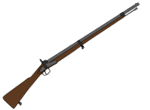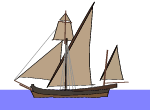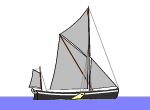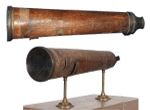
Glossaire anglais-français des termes de la marine ancienne 1780-1830
| A | B | C | D | E | F | G | H | I | J | K | L |
| M | N | O | P | Q | R | S-Sh | Si-Sz | T | U | V | WXYZ |
 |
 |
 |
 |
| N - dictionnaire anglais-français des termes marins, à l’intention des amateurs des romans historiques 1780-1830 | ||
| narrows - see coastline | détroit - voir littoral | |
| nautical mile (1850 metres, the length of a minute of arc of latitude along a meridian) | mille marin (nm, unité de longueur qui correspond à 1850 mètres, la longueur d'une minute d'arc de latitude le long d'un méridien) | |
navigation (the science of finding a ship's position and direction, and of plotting a course along a particular route towards its destination): (1) astro-navigation: latitude and longitude. See sextant. |
|
navigation (nf, l'art, le métier du navigateur; la science de situer et d’orienter le navire, et de le diriger vers des lieux repérés selon une route déterminée). (1) navigation hauturière: latitude et longitude. Voir sextant. (2) cabotage: position par rapport à des points remarquables sur la côte. Voir amer et relèvement. |
| navigator (person who has the skills to plot the ship's course) | navigateur (nm, personne qui a les connaissances pour tracer la route du navire) | |
| to navigate, the task of the navigator | naviguer (v, piloter un navire, le métier du navigateur) | |
| navigation aid; a pole or buoy used as a channel marker | balise (nf, dispositif d'aide à la navigation maritime; une perche ou une bouée) | |
| navy (ships of war) | Marine nationale (nf, vaisseaux de guerre) | |
| neap tides - see tide | marées de mortes-eaux - voir marée | |
| neck-cloth | cravate (nf) | |
| night-glass ("Large spherical lenses are very good for making night glasses; the English have made telescopes of this sort and they use them to great advantage to see ships from far off on dark nights" Buffon, 1835) | lunette de nuit (« Les verres sphériques larges sont très bons pour faire des lunettes de nuit ; les Anglais ont construit des lunettes de cette espèce, et ils s'en servent avec grand avantage pour voir de fort loin les vaisseaux dans une nuit obscure» Buffon, 1835) | |
| nipper (see messenger cable) | garcette de tournevire (voir tournevire) | |
| north - see compass rose | nord, nordé, nordet, noroît - voir rose des vents | |
| O- dictionnaire anglais-français des termes marins, à l’intention des amateurs des romans historiques 1780-1830 | ||
| oakum, tow (fibres of flax or hemp left over from the manufacture of rope. Impregnated with tar, it is used to fill and seal the seams between the planks of hull and deck) | étoupe, filasse (nf, fibres de lin ou de chanvre rejetées pendant la préparation des cordages. L'étoupe est imprégnée de goudron et utilisée pour emplir les joints du bordé afin de les rendre étanches) | |
| oar - see rowing | aviron - voir nager | |
| oar blade - see rowing | pelle (nf, lame de l'aviron) - voir nager | |
| oarsman - see rowing | nageur (nm, rameur) - voir nager | |
| officer | officier (nm) | |
| officer of the merchant service | officier marchand | |
| officer of the watch | officier de quart | |
| junior officer | officier subalterne | |
| offing (to make your offing, to sail away from land) | large (nm, se mettre au large, naviguer vers le large) | |
| offshore | au large | |
| off Ushant | au large d'Ouessant | |
| oilskins (waterproof coat made of oiled cloth) | ciré (nm, manteau imperméable fait de tissu huilé) | |
| old salt (sea dog, experienced old sailor) | loup de mer (nm, vieux marin expérimenté) | |
| open sea, the high seas | large (nm, haute mer) | |
| order (command) | consigne (nf), ordre (nm) | |
| order of sailing (within a fleet) | ordre de marche | |
| ordnance (cannon, carronades, swivel-guns, mortars, etc) | artillerie (nf, les canons, caronades, les pierriers, les mortiers, etc) | |
| orlop (the lowest deck of a ship, not caulked) | faux pont (pont inférieur d'un navire, non calfaté) | |
| owner, ship owner | armateur (nm) | |
| P - dictionnaire anglais-français des termes marins, à l’intention des amateurs des romans historiques 1780-1830 | ||
| packet, packet boat (ship or boat carrying mail, passengers and some goods) | malle (nf, paquebot transportant du courrier, des marchandises et des passagers) | |
| painter (bow rope of a boat) | bosse de canot (nf) | |
| palm (sailmaker's palm, a leather glove or a strip of leather that wraps round the hand, reinforced in the hollow of the palm with a metal disc that is used like a domestic thimble when sewing sails) | paumelle de voilier (nf, gant en cuir, ou lanière de cuir encerclant la paume de la main, renforcé dans le creux de la paume d'une plaque métallique servant de dé à coudre pour la couture des voiles) | |
| parley (negotiations) | pourparlers (nmpl, négociation) | |
| to pass: (1) to go past a place, to go by an object (2) to pass the word for (to send for) "Pass the word for Mr ____________" |
passer (v): |
|
| pawl (click, part of a ratchet; tongue made of wood or iron, the purpose of which is to brake a capstan or windlass) | linguet, élinguet (nm, cliquet; languette en bois ou fer dont la fonction est d’arrêter le cabestan ou guindeau) | |
| to pay : (1) to pay money (2) to apply a coating of pitch |
(1) payer (v, donner de l‘argent) (2) brayer (v, enduire de brai) |
|
| to pay off : (1) of a sailing vessel, to establish itself on a new course after tacking (2) of a ship, to take it out of service (3) of its crew, to discharge |
(1) d'un voilier, s'établir sur la nouvelle amure après virement de bord (2) d'un navire, désarmer (3) de son équipage, congédier |
|
| to pay out (to veer, to allow some rope to run out) | filer (v, larguer; filer un câble, filer le loch) | |
| pea-jacket (pea-coat, reefer; short, warm, waterproof wool coat, with or without a hood) | caban (nm, manteau court en laine, chaud et imperméable, avec ou sans capuche) | |
| pendant, commission pendant (long, thin, triangular flag) | flamme (nf, pavillon long, étroit et triangulaire) | |
| broad pendant (flag denoting commodore's ship) | cornette (nf, guidon, pavillon du chef d'escadre) | |
| pendant (buoy rope, rope linking an anchor to a buoy) | orin (nm, cordage frappé sur une bouée dont l'extrémité est reliée à une ancre) | |
| peninsula - see coastline | presqu'île - voir littoral | |
| petty officer (of a ship of war) | maître (nm, grade militaire entre matelot et officier) | |
| petty officer, junior; for example the boatswain's mate | contre-maître « le troisième des officiers mariniers de manœuvre : le maître et le second maître étant avant lui » | |
| pier (jetty, a permanent platform or deck supported on piles) | estacade (nf, plate-forme fixe supportée par des pilotis) | |
| pike (a weapon consisting of a metal point on the end of a long pole) | pique (nf, une arme composée d'une pointe métallique fixée au bout d'un long manche) | |
| pilot (expert employed by the state to guide ships in and out of ports and estuaries) | pilote (nm, expert commissionné par l'état pour la conduite des navires à l'entrée et à la sortie des ports et estuaires) | |
| pilot cutter - see cutter | côtre pilote (nm) - voir côtre | |
| piloting (navigation within a limited distance of the coast, by taking bearings on lighthouses, navigation marks and landmarks) | cabotage (nm, navigation à distance limitée des côtes, en prenant les relèvements des phares, des balises et des amers) | |
| pin: (1) peg, treenail; wooden fastening for joining timbers (2) belaying pin (a large cylindrical pin of iron or hard wood, to which the end of a rope can be attached) |
(1) gournable (nf, cheville de bois dur servant à assembler la charpente et les bordages du navire) (2) cabillot (nm, grosse cheville de fer ou de bois dur tourné, pour amarrer les manœuvres) |
|
| pin rack (wooden shelf with holes to take belaying pins, to which the ropes of the running rigging are attached) | râtelier à cabillots (élément de bois perforé, destiné à fixer les cordages à l’aide de cabillots | |
| pink (small trading vessel with two masts and two lateen sails. See vessel comparison chart) | pinque (nm, petit bâtiment marchand à deux mâts et deux voiles latines. Voir tableau comparatif des bâtiments) | |
| pinnace (ship's boat for officers) | second canot (canot de l'état-major) | |
| pintle (hinge pin fixed to the rudder stock of a boat, which rotates in a socket called the gudgeon) | aiguillot (nm, pivot fixe sur le safran du gouvernail d'un bateau et qui tourne dans un fémelot) | |
| to pipe the side (to use bosun's calls aboard ship so as to mark the arrival or departure of an officer) | siffler sur le bord (v, rendre les honneurs du sifflet aux officiers quand ils montent à bord d'un navire ou quand ils le quittent) | |
| piping the starboard side | honneur à tribord | |
| pistol | pistolet (nm) | |
| pitch (thick, dark brown, sticky substance obtained from the distillation residue of pine tar. A sort or resin, used to caulk the seams of wooden sailing vessels and as a protective coating for ropes) | poix (nf, résidu brun foncé, épais, visqueux, obtenu après distillation fractionnée de goudron de pin. Espèce de résine qui sert à calfater les vaisseaux et comme enduit pour la préservation des cordages) | |
| pitching (of a ship, rotation around the transverse axis; vertical movements of bow and stern. See also roll and yaw) | tangage (nm, d'un navire, mouvements de rotation autour de l'axe transversal; balancement longitudinal d'un navire. Voir aussi roulis et embardée) | |
| to pitch | tanguer (v) | |
| to pitchpole (to capsize by a forward somersault after burying the bow in the sea) | sancir (v, faire une culbute; chavirer par l'avant en plongeant d’abord son avant) | |
| planking | bordage (nm) | |
| ship's planking in its entirety | bordé (nm, l'ensemble du bordage) | |
| to plank a ship | border (v) | |
| polacre, polacca (small merchant vessel with three one-piece masts carrying square and lateen sails. See vessel comparison chart) | polacre (nf, petit bâtiment marchand; trois mâts à pible, et des voiles carrées et latines. Voir tableau comparatif des bâtiments) | |
| poop (stern, the aft end of the ship) | poupe (nf, l'arrière du navire) | |
| poop-deck (a structure forming a raised deck across the full width of a ship of the line) | dunette (nf, superstructure sur le pont arrière d'un vaisseau de ligne et qui s'étend en largeur d'un côté à l'autre) | |
| to poop (a ship is pooped if a wave overtakes it from behind and covers its after deck) | acculer, coiffer (v, un navire est coiffé par la mer lorsque sa poupe est recouverte par une lame) | |
| point-blank range, at (at very short range) | à bout portant (à très courte portée) | |
| point of the compass (an angular sector from the compass rose; 11.25 degrees) | quart du compas (un secteur angulaire de la rose des vents; 11,25 degrés) | |
| point of sailing (the angle the ship makes with the wind). Note: a point is an angular sector of the compass rose. One point is 11.25 degrees | allure (nf, l'orientation du bateau par rapport au vent). A noter: le quart est un secteur angulaire de la rose du compas qui correspond à 11,25 degrés | |
points of sailing to windward, "hauling the wind" or "beating":
|
allures du près (celles où, voiles bordées, le voilier remonte contre le vent):
|
|
points of sailing with the wind coming from the side ("large") include:
|
allures portantes (celles où le navire reçoit le vent de côté ou de l’arrière) incluent:
|
|
points of sailing before the wind:
|
allures du vent arrière:
|
|
| pomelion - see cannon | bouton de culasse - voir canon | |
| port: (1) harbour (2) larboard; for an observer standing on a ship and facing forwards, the left side. See starboard) |
|
(1) port (nm) (2) bâbord (adj & nm, partie située à gauche d’un navire pour un observateur regardant vers l’avant. Voir tribord) |
| port admiral | préfet maritime (nm) | |
porthole, port-light (in the Royal Navy, usually called a scuttle. It may be a small opening, approximately square, made in the side of a large vessel to allow air and light below decks; or it may be a small hole, hermetically sealed with thick glass or bullseye glass, to allow light into the tweendecks areas of a large vessel and the orlop deck of a ship. See also deadlight and skylight) |
hublot (nm, « petit sabord; ouverture à peu près carrée, qu'on perce dans la muraille des grands bâtiments, pour donner du jour et de l'air dans l'entrepont...d'autres hublots fermés hermétiquement par de fortes glaces, ou des verres lenticulaires, donnent du jour dans les entreponts des grands bâtiments et dans les faux-ponts des vaisseaux». Voir aussi claire-voie) | |
| port-lid (hinged shutters to block off the openings of the gun-ports) | mantelet (nm, volets de fermeture des sabords, qui pivotaient sur des gonds) | |
| position (1) astro-navigation: the ship's latitude and longitude. See sextant (2) piloting: the ship's position in relation to distinctive objects on the coast. See landmark and bearing |
|
point (nm) (1) navigation hauturière: latitude et longitude du lieu où se trouve un navire en mer. Voir sextant . (2) cabotage: la position où se trouve le navire par rapport à des points remarquables sur la côte. Voir amer et relèvement |
| position > estimated position (ship's current position calculated on the basis of its speed and direction, taking account of wind and tide) | point estimé (point qu'on déduit d'après la vitesse du navire et sa direction, en tenant compte de la dérive due au vent et au courant) | |
| position > to fix the ship's position | faire le point (déterminer la position du navire) | |
| position > take the noon sight (astronavigation - to find ship's position with sextant) | faire le point de midi (navigation hauturière - faire le point avec sextant) | |
| post captain (of a ship of war) | capitaine de vaisseau (du Roi) | |
| made post, promoted to post captain | promu au rang de capitaine de vaisseau | |
| posting, shore posting | affectation (nf), affectation à terre | |
| powder (gunpowder. See also magazine) | poudre à canon (nf) | |
| "Prepare to give way.... give way!" - see rowing | « Avant partout ...deux !» - voir nager | |
| press (forcible recruitment by the press-gang in harbour towns or from the crew of intercepted merchant ships) | presse (nf, enrôlement forcé par rafle pratiquée dans les ports ou enlèvement sur des bâtiments marchands arraisonnés) | |
| preventer stay | faux étai | |
| priming (gunpowder used to set off the main charge of a firearm) | amorce (nf, poudre à canon qui sert à enflammer la charge d’une arme à feu) | |
| priming-hole, vent - see cannon | lumière - voir canon | |
| prison hulk (dismasted ship, anchored in a port and used as a floating prison. For French sailors the expression refers in particular to the English prisons of sinister memory) | ponton-prison (dans la Marine française, désigne surtout les prisons flottantes anglaises de sinistre mémoire, de vieux navires réformés dématés dans les ports anglais) | |
| privateer (commerce destroyer, raider of merchant ships. A "letter of marque" is the principal difference between a privateer and a pirate. It is a document signed in the name of the king which appoints the privateer as a naval auxiliary) | corsaire (nm, homme ou navire pratiquant la guerre de course. La «lettre de marque» est la différence principale entre corsaires et pirates. Il s'agit d'un document délivré au nom du roi et qui reconnaît le corsaire comme force militaire auxiliaire) | |
| prize (captured enemy ship) | prise (nf, navire capturé sur l'ennemi) | |
| prize crew | équipage de prise (nm) | |
| prize > to put a prize crew aboard a captured ship | amariner (v, envoyer un équipage occuper une prise) | |
| prize-master | officier qui commande une prise | |
| prize money (value of a captured enemy ship, sum of money divided amongst the crew, the captain and the admiral) | part de prise (valeur d'un navire capturé sur l'ennemi, somme d'argent partagée entre l'équipage, le capitaine et l'amiral) | |
| provisions (ship's food supplies) | vivres (nmpl, l’avitaillement du bord) | |
| prow (bow, front end of a boat) | proue (nf, la partie avant d'un bateau) | |
| to pull (to pull hard on an oar) | souquer (v, tirer fortement sur un aviron) | |
| pump | pompe (nf) | |
| pump handle (lever that actuates a pump) | bringuebale (nf, brimbale ou levier qui sert à faire marcher une pompe) | |
| purser (person in charge of food stores aboard ship) | maître-commis, commis aux vivres (nm, celui qui est chargé des approvisionnements sur un navire) | |